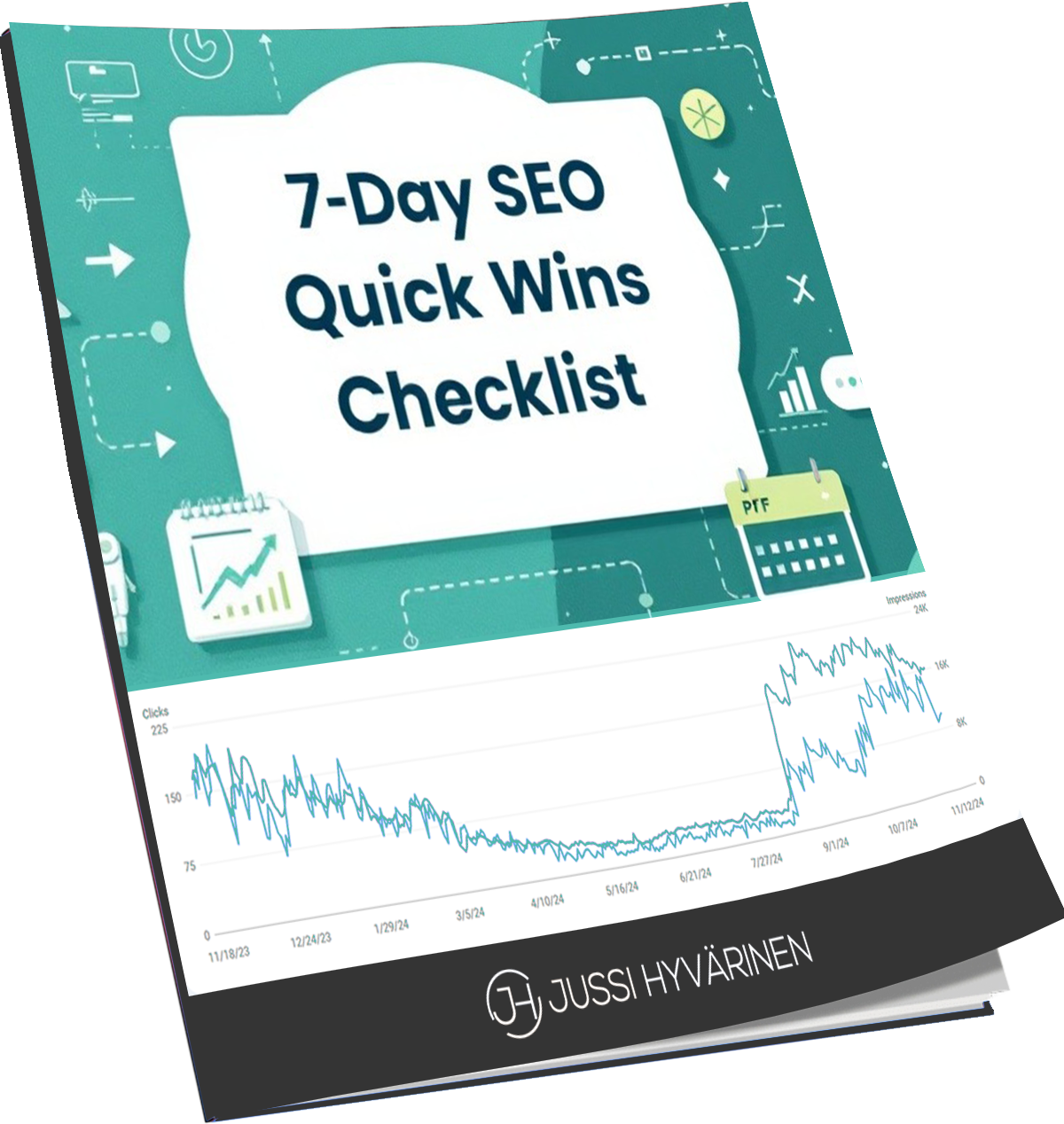Have you ever wondered how some websites seem to pop up out of nowhere and start ranking for competitive keywords almost overnight?
Chances are, they may be employing a powerful but controversial SEO strategy called parasite SEO.
What is Parasite SEO?
Parasite SEO is a strategy where you publish content on high-authority domains to rank for competitive keywords. These domains—trusted by Google and backed by strong backlink profiles—act as a "host" for your content, lending their authority to help your page rank quickly in search engine results pages (SERPs).
"These days the content isn't king, the authority is."The "parasite" metaphor refers to how your content thrives on the strength of the host's domain, allowing you to bypass the lengthy process of building your own site's authority.
This strategy is especially popular for affiliate marketers, as it enables them to rank monetized content directly on high-ranking domains, often embedding affiliate links to drive revenue.
For example, instead of publishing a blog post about "best diet pills" on your own domain, which might struggle to rank in a competitive niche, you could publish the same content on a trusted platform like a news site or Medium.
By embedding affiliate links in the content, you can monetize it directly, bypassing the need to send traffic to your own site.
How Does Parasite SEO Differ From Traditional SEO?
With traditional SEO, the focus is on optimizing your own website and gradually earning backlinks and authority over time. This involves on-page optimization, technical SEO, content marketing, and link building to improve your site's relevance, credibility, and search rankings.
Traditional SEO | Parasite SEO |
|---|---|
Builds authority over time on your own domain | Leverages existing authority of third-party domains |
Requires significant investment in link building | Can rank even with zero backlinks due to the host site's authority |
Long-term strategy for sustainable growth | Often used for quick wins or short-term campaigns |
Full control over your content and site | Limited control; content can be removed or altered by the host site at any time |
Parasite SEO, in contrast, leverages the existing authority of other domains. Instead of spending months or years building your own authority, you tap into the built-in power of sites that Google already knows and trusts.
Common Platforms for Parasite SEO
To implement a parasite SEO strategy, you need to find established, authoritative platforms to host your content. Some popular options include:
- High-authority domains like LinkedIn and Medium, where you can post your articles for free
- News sites that sell sponsored content (can be costly)
- Social media platforms like X and Pinterest
- Video-sharing sites like YouTube and Vimeo
- Q&A and forum sites like Reddit and Quora
Reddit's traffic growth has been one of the craziest things I've seen since entering the online business. Marketers, of course, go to the platforms where the traffic is.
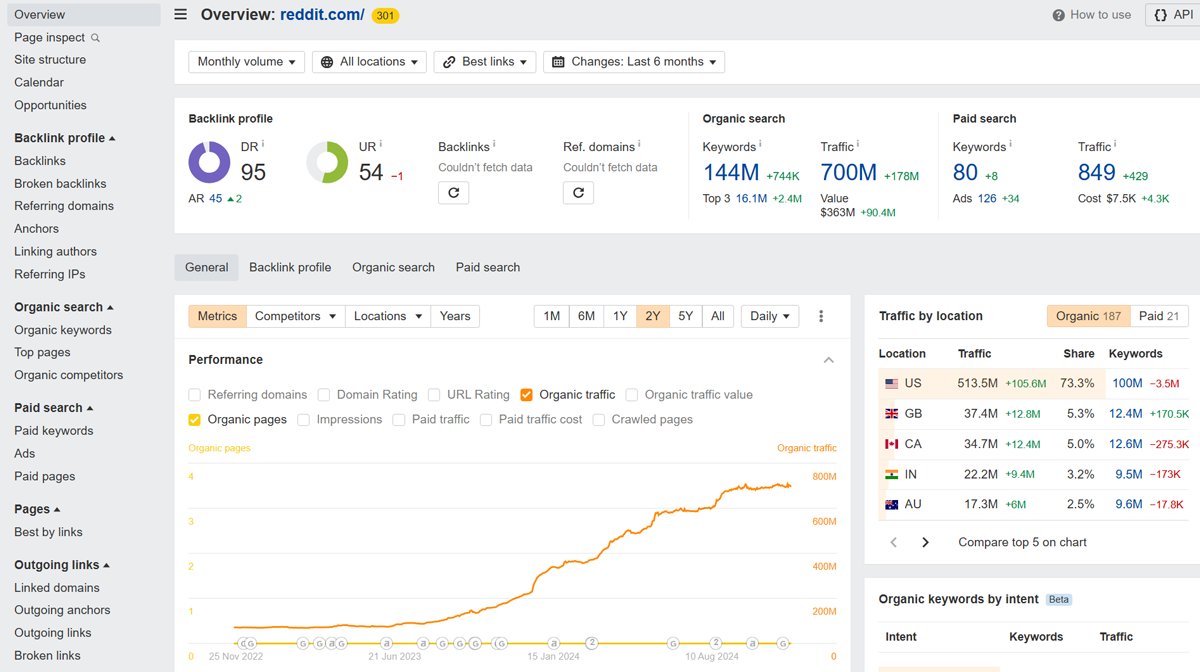
I cannot say I blame them since Google demolished thousands upon thousands of small publishers' sites with the notorious HCU algorithm update.
Also, If you think about it, the concept of parasite SEO applies to YouTube as well. Technically speaking, people are leveraging the site's high authority when they post their videos on the platform.
Case Forbes Advisor
To better understand why authority matters so much, I wanted to share an example that just happened.
On November 19th, 2024, Google announced its updated site reputation abuse policy to fight against spam by taking advantage of the site's established ranking signals.
Forbes Advisor is one of the sites that fall into this category. It exploits the Forbes main site's high DR by recommending all imaginable products without any real knowledge of them and making millions doing this.
Google slapped a manual penalty on Forbes Advisor, and the whole subdirectory got deindexed, causing all the articles to disappear from Google SERPs.
What did Forbes do? They moved all the content from the Advisor subdirectory to the new Portfolio subdirectory, and guess what happened?
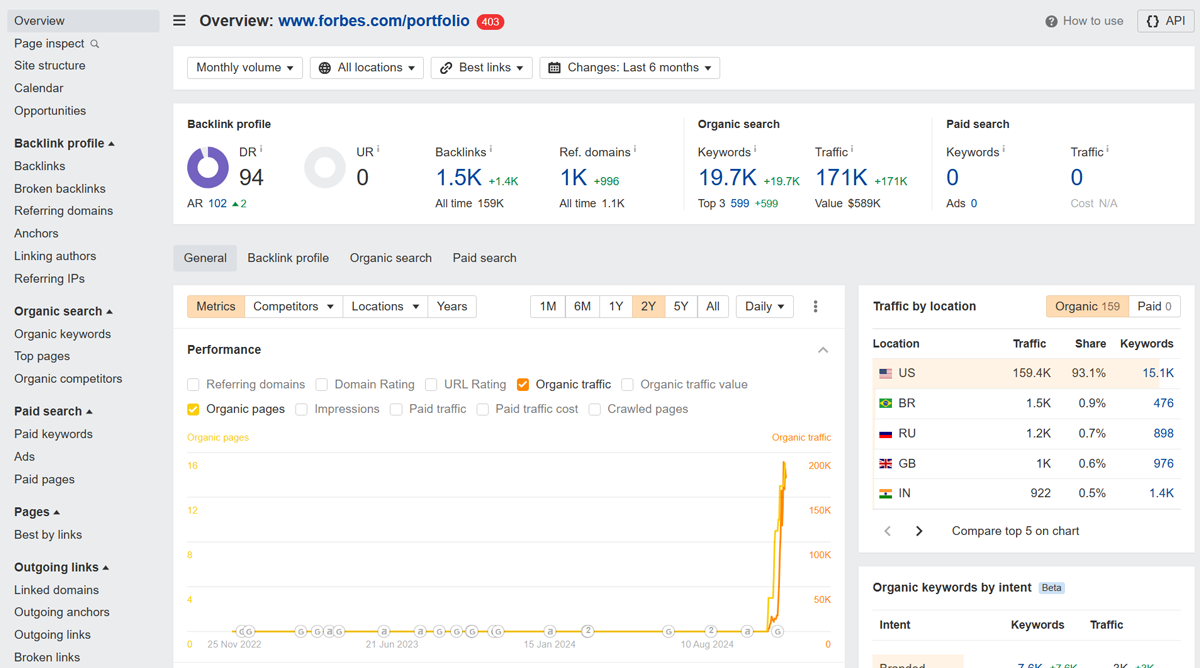
The rankings and traffic surged back overnight. That's what authority means. We haven't seen the final chapter of this saga yet, but it will be interesting to see what happens and how Google reacts.
But if Google doesn't do anything, it means that parasite SEO has won.
How to Implement Parasite SEO?
If you want to try Parasite SEO, here's a step-by-step guide to help you get started:
- Find Profitable Keywords: Use tools like Ahrefs or SEMrush to identify high-volume keywords with commercial intent. Look for terms that align with your affiliate offers or monetization goals.
- Identify High-Authority Platforms: Research platforms that allow guest posts, sponsored content, or self-publishing. Examples include news sites, Medium, LinkedIn Pulse, and forums like Reddit.
- Create High-Quality Content: Write content that is optimized for your target keywords and provides real value to readers. Ensure that your affiliate links are included naturally.
- Publish on the Host Platform: Depending on the platform, you may need to negotiate a sponsored post or pitch a guest article. For self-publishing platforms, you can publish directly.
- Promote Your Content: Share your content on social media, forums, and email newsletters to attract engagement and backlinks. Promotion helps boost visibility and rankings.
- Track Results: Monitor indexing of the articles, keyword rankings, referral traffic, and affiliate conversions to measure the performance of your parasitic content.
This process is particularly effective for niches with high affiliate potential, such as finance, health, and technology.
Check Your Parasite Article Rankings and Indexing with My Chrome Extensions
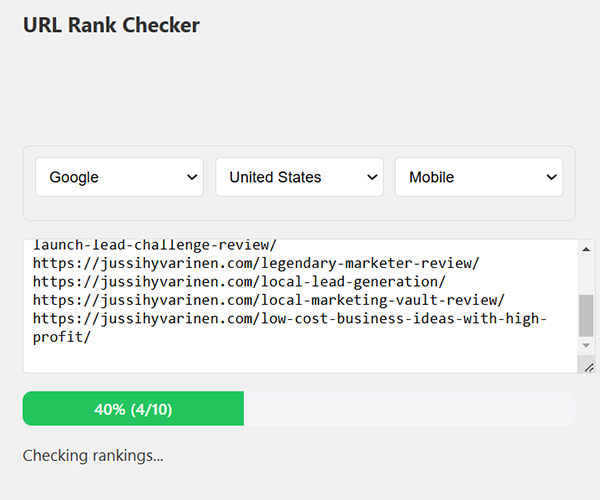
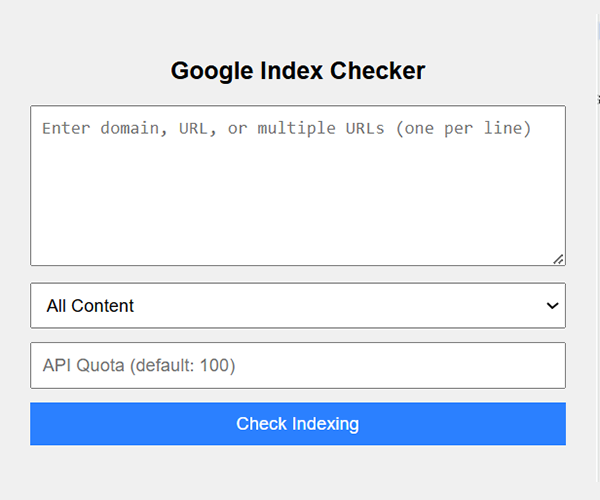
What Are the Advantages of Parasite SEO?
When done strategically, parasite SEO offers some enticing benefits:
- Content published on high-authority domains can often rank much faster than on a new website. This allows you to potentially get organic traffic flowing sooner.
- Building a new website's authority through traditional SEO and content marketing can take substantial time and resources. Parasite SEO allows you to leverage existing authority without that lengthy upfront investment.
- When you publish on domains that already have a strong backlink profile, your content can rank without needing to build as many links yourself. The host platform's authority acts as a shortcut.
- Searchers are more likely to click on results from domains they recognize and trust. Having your content appear on well-known platforms can boost credibility and click-through rates.
- In addition to search engine traffic, high-authority domains often have their own built-in audience. Your parasitic content can attract clicks from the host platform's visitor base.
What Are the Risks and Disadvantages?
Parasite SEO has also some potential drawbacks:
- When your content lives on third-party platforms, you sacrifice a degree of control. The host site could change its policies, remove your content, or even shut down entirely.
- If a significant portion of your traffic comes from parasitic content, you're reliant on the continued success of those platforms. Any drop in their search rankings or traffic could directly impact your revenue.
- Platforms may suspend or ban your account if they feel you're violating their terms of service or trying to manipulate rankings. It's crucial to follow each site's guidelines and avoid spammy tactics.
- As more people use parasite SEO in your niche, the strategy could become less effective over time.
- Most experts view parasite SEO as a short-term tactic rather than a complete SEO strategy. For long-term success, you must still focus on building your domain's authority and brand.
Is Parasite SEO Legal and Ethical?
The legality and ethics of parasite SEO are somewhat of a grey area. Most of the tactics involved, like guest posting are common practice. The key is how you implement them.
Spamming platforms with low-quality, over-optimized content and irrelevant links is clearly black hat SEO and will likely get you penalized or banned. However, creating genuine, valuable content that follows each platform's guidelines tends to fall under white hat SEO.
From an ethical standpoint, some argue that parasite SEO is a manipulative shortcut that leeches value from other domains. Others see it as a legitimate way to demonstrate your expertise and expand your audience on industry-leading platforms.
Ultimately, parasite SEO is about adding value for readers, not just trying to siphon off SEO authority. As long as you stay within a platform's terms of service and create truly useful content, most consider this an above-board approach.
Best Practices for Parasite SEO
If you decide to pursue parasite SEO, follow these tips to maximize your results and minimize risks:
- Don't try to spam your way to the top. Create genuinely useful, engaging content that delivers value for readers. This is essential for both rankings and brand credibility.
- Thoroughly read each host platform's terms of service, content guidelines, and webmaster rules. Respect their policies to avoid penalizations and maintain positive relationships.
- Include natural, relevant links that provide additional value for readers. Stick to just a couple of links per piece of parasite content.
- Don't try to rank for every keyword remotely connected to your business. Target searches where your content is truly relevant and useful for that audience. That's what Google ultimately looks for.
- Don't rely solely on parasite SEO. Combine it with traditional on-page optimization, technical SEO, owned content creation, and link building. This creates a more well-rounded, sustainable SEO strategy.
- Track your keyword rankings, organic traffic, and conversions from each piece of parasite content. See what's working and what's not. Look for opportunities to update and optimize your off-site content over time.
- While you can achieve quick gains from parasite SEO, your long-term goal should be building your domain's authority. Use parasitic content to attract links and publicity to your own website to improve your organic ranking power over time.
What's the Future of Parasite SEO?
Many SEO experts have speculated about whether parasite SEO will remain viable in the long term. As Google improves at evaluating content quality and cracks down on parasite sites, this tactic may become less effective over time.
However, as we have seen in SEO when another opportunity dies, another emerges. So, I wouldn't conclude the death of parasite SEO just yet.
To stay ahead of the curve:
- Focus on creating truly remarkable content that stands out from the noise.
- Prioritize value over volume.
- Rather than just using parasite SEO to game rankings, leverage it to build real relationships and establish your brand as a credible industry voice.
It's also wise to focus more on owned channels like your website, email list, and social media profiles. Use parasite SEO for traditional SEO and content marketing as a complementary tactic, not a complete replacement.
Is Parasite SEO Right For You?
Now that you understand how parasite SEO works, you can decide if it's a smart fit for your website. This approach tends to work best for:
- New websites that need a boost in authority to start ranking
- Established sites targeting highly competitive keywords
- Businesses with limited budgets for content creation and link-building
- Short-term campaigns designed to drive a quick influx of search traffic
- Brands looking to expand their audience on industry-leading platforms
You may not need parasite SEO if you have a well-established website with years of authority and a comprehensive SEO strategy. Your efforts are likely better spent deepening your own site's topical authority through content hubs, pillar pages, and internal link building.
Parasite SEO in Action
To help illustrate the potential of parasite SEO, let's look at a few real-world examples.
1) The Keyword "best vacuum for pet hair" has 30K monthly searches, according to Ahrefs. If we look at the SERPs, we can see that many pages rank on the first page and can be considered parasite SEO.
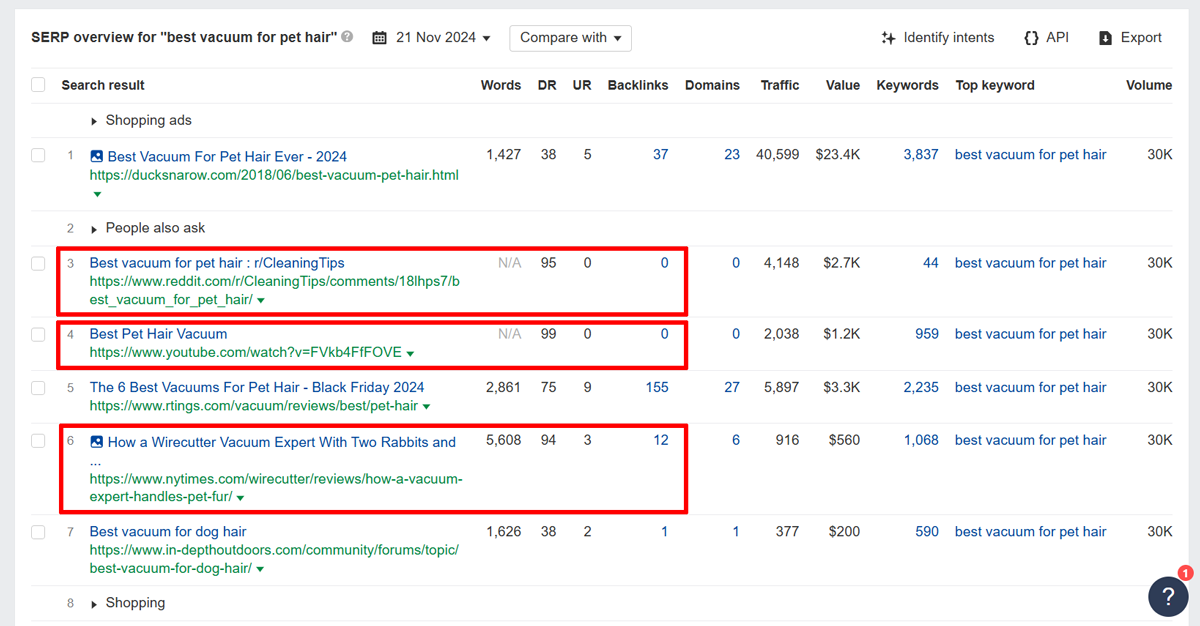
2) The keyword "best online course platforms" also has Reddit and Quora on the first page of the Google SERPs.
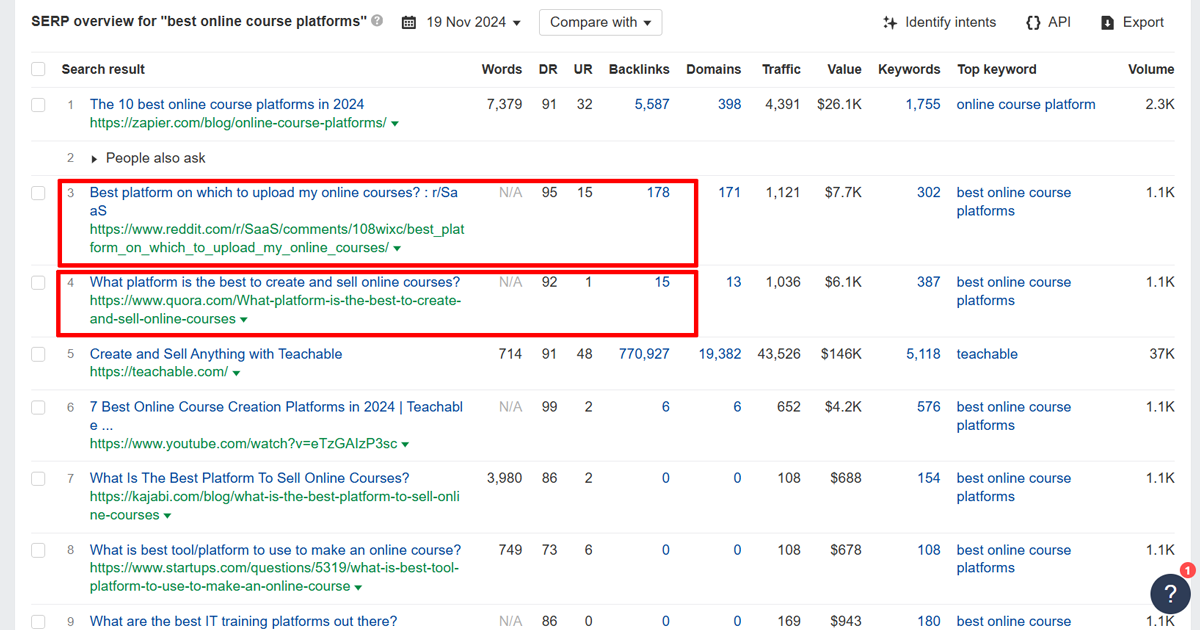
Reddit is on the first page of Google with almost every keyword imaginable. If you can master Reddit parasite SEO, you can make a lot of money with the right strategy. With my Rank Checker tool, you can also check Reddit posts' rankings.
Measuring Parasite SEO Success
To gauge the ROI of your parasite SEO campaigns, you need to look at the right metrics. Some key performance indicators (KPIs) to track include:
- Search Rankings: Use my Indexing and Rank Checker tools to see if your parasitic content ranks for target keywords. Track how those rankings change over time.
- Referral Traffic: Set up Google Analytics to monitor how much traffic your parasitic content sends to your offer or website. Look at metrics like pages per visit, time on site, and bounce rate to gauge the quality of that traffic.
- Conversions: Track form submissions, email opt-ins, sales, or other desired actions driven by visitors from your parasite content.
- Backlinks Earned: Monitor how many other websites link to your parasite content using backlink analysis tools like Ahrefs. This shows the content's extended SEO impact and perceived authority.
- Brand Mentions: Set up Google Alerts or use social listening tools to track brand mentions across the web. See if your parasite content is generating buzz and discussions in your industry.
- Authority Metrics: Track your own domain authority over time using metrics like Moz's Domain Authority or Ahrefs' Domain Rating. See if parasite SEO appears to boost your site's overall authority.
Look at these KPIs in relation to the time and money invested in parasite SEO. If you're seeing strong improvements, those campaigns are likely profitable. If not, you may need to adjust your targeting, content quality, or promotion strategies.
Check Your Parasite Article Rankings and Indexing with My Chrome Extensions


Avoid These Parasite SEO Pitfalls
As with any SEO tactic, there are some common mistakes to avoid:
- Don't stuff your content and links with exact-match anchor text phrases. This looks unnatural to both users and search engines. Prioritize content quality over keyword placement.
- Always read a platform's content rules, terms of service, and webmaster guidelines. Never buy or sell links, post misleading content, or otherwise try to manipulate rankings.
- The goal isn't just to publish content but to publish GREAT content. Every post should be well-researched, insightful, and genuinely useful for readers. Don't cut corners on quality.
- Your content shouldn't be "set it and forget it". Periodically update posts with new information, fresh links, and improved targeting. Make sure all links remain active over time.
- Focus on a few strategic, relevant platforms for your parasite SEO. Don't try to publish low-quality posts on every domain you can find. This will damage your brand credibility and search rankings.
A Starting Framework For Parasite SEO
If you're ready to start exploring parasite SEO for your website, here's a basic framework to follow:
- Define your goals and target keywords
- Research relevant, high-authority platforms in your niche
- Analyze competing content on those platforms for gaps and opportunities
- Create a content calendar for 5-10 parasite posts
- Produce genuinely valuable content
- Publish content on your chosen platforms with relevant links back to your offer or site
- Promote parasite content via social media, email, forums, and communities
- Monitor rankings, traffic, and conversions from parasite content
Remember, parasite SEO is one component of a diversified search marketing strategy. It shouldn't replace your other SEO and content marketing efforts. However, it can be a powerful tool to increase your brand's reach and authority online when used ethically and strategically.
The Key Takeaways
Now that you've finished this guide, you should have a comprehensive understanding of what parasite SEO is, how it works, and how to implement it.
The key takeaways are:
- Parasite SEO involves leveraging the authority of other domains to increase your own site's rankings and traffic
- This strategy is most effective for new sites, competitive niches, and short-term traffic campaigns
- You must prioritize quality, relevance, and platform compliance for this approach to work
- Parasite SEO should be part of a broader search marketing strategy, not your only tactic


